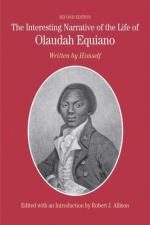Our manner of living is entirely plain; for as yet the natives are unacquainted with those refinements in cookery which debauch the taste: bullocks, goats, and poultry, supply the greatest part of their food. These constitute likewise the principal wealth of the country, and the chief articles of its commerce. The flesh is usually stewed in a pan; to make it savoury we sometimes use also pepper, and other spices, and we have salt made of wood ashes. Our vegetables are mostly plantains, eadas, yams, beans, and Indian corn. The head of the family usually eats alone; his wives and slaves have also their separate tables. Before we taste food we always wash our hands: indeed our cleanliness on all occasions is extreme; but on this it is an indispensable ceremony. After washing, libation is made, by pouring out a small portion of the food, in a certain place, for the spirits of departed relations, which the natives suppose to preside over their conduct, and guard them from evil. They are totally unacquainted with strong or spirituous liquours; and their principal beverage is palm wine. This is gotten from a tree of that name by tapping it at the top, and fastening a large gourd to it; and sometimes one tree will yield three or four gallons in a night. When just drawn it is of a most delicious sweetness; but in a few days it acquires a tartish and more spirituous flavour: though I never saw any one intoxicated by it. The same tree also produces nuts and oil. Our principal luxury is in perfumes; one sort of these is an odoriferous wood of delicious fragrance: the other a kind of earth; a small portion of which thrown into the fire diffuses a most powerful odour[D]. We beat this wood into powder, and mix it with palm oil; with which both men and women perfume themselves.
In our buildings we study convenience rather than ornament. Each master of a family has a large square piece of ground, surrounded with a moat or fence, or enclosed with a wall made of red earth tempered; which, when dry, is as hard as brick. Within this are his houses to accommodate his family and slaves; which, if numerous, frequently present the appearance of a village. In the middle stands the principal building, appropriated to the sole use of the master, and consisting of two apartments; in one of which he sits in the day with his family, the other is left apart for the reception of his friends. He has besides these a distinct apartment in which he sleeps, together with his male children. On each side are the apartments of his wives, who have also their separate day and night houses. The habitations of the slaves and their families are distributed throughout the rest of the enclosure. These houses never exceed one story in height: they are always built of wood, or stakes driven into the ground, crossed with wattles, and neatly plastered within, and without. The roof is thatched with reeds. Our day-houses are left open at the sides; but those in which we




